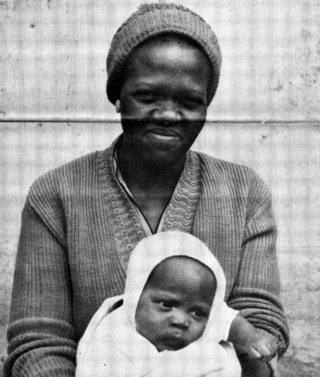Related Research Articles
Ray Alexander Simons (née Alexandrowich; was a South African communist, anti-apartheid activist, campaigner and trade unionist who helped draft the Women's Charter. She moved to Cape Town in 1929 to escape the persecution of Jews and communists.
Trade unions in South Africa has a history dating back to the 1880s. From the beginning unions could be viewed as a reflection of the racial disunity of the country, with the earliest unions being predominantly for white workers. Through the turbulent years of 1948–1991 trade unions played an important part in developing political and economic resistance, and eventually were one of the driving forces in realising the transition to an inclusive democratic government.

Internal resistance to apartheid in South Africa originated from several independent sectors of South African society and took forms ranging from social movements and passive resistance to guerrilla warfare. Mass action against the ruling National Party (NP) government, coupled with South Africa's growing international isolation and economic sanctions, were instrumental in leading to negotiations to end apartheid, which began formally in 1990 and ended with South Africa's first multiracial elections under a universal franchise in 1994.

Elizabeth Mafekeng was a South African trade union and political leader who fought against the injustices suffered by the working class and against the racial segregation laws imposed by the apartheid system.
The Congress Alliance was an anti-apartheid political coalition formed in South Africa in the 1950s. Led by the African National Congress, the CA was multi-racial in makeup and committed to the principle of majority rule.
Florence Grace Mkhize was an anti-apartheid activist and women's movement leader. Mkhize was usually called 'Mam Flo'. Mkhize was also involved in trade unions in South Africa, organizing for the South African Congress of Trade Unions (SACTU).
The South African Congress of Trade Unions (SACTU) was a national trade union federation in South Africa.
Oscar Mafakafaka Mpetha was born in Mount Fletcher 5 August 1909 and died on 15 November 1994. He was a South African trade unionist and political activist.
The Food and Canning Workers' Union (FCWU) was a trade union representing food processing workers in South Africa. Its members were mainly based in the Western and Eastern Cape. It was affiliate with the African Food and Canning Workers' Union (AFCWU).

Viola Hashe (1926-1977) was a teacher, anti-apartheid activist and trade unionist in South Africa. Hashe was also blind.
Mary Moodley was a trade unionist and anti-apartheid activist in South Africa. Moodley regularly shared her home in the black district of Wattville Township with her family and homeless people, both black and white. She was generous with the little money she had and was a "regular churchgoer."
Phyllis Altman was a trade unionist and anti-apartheid activist in South Africa. Altman was an employee of the South African Congress of Trade Unions (SACTU). She was also the general secretary of the International Defence and Aid Fund (IDAF), and a fiction writer.
Rita Alice Ndzanga was a South African anti-apartheid activist and trade unionist.
Shulamith Muller was a South African lawyer, communist, and anti-apartheid activist. Muller was one of the attorneys for the 1956 Treason Trial.
Christina 'Chrissie' Jasson was a South African clerk and trade unionist from Port Elizabeth, who stood accused of treason at the Rivonia Trial.
John Kgwana Nkadimeng was a South African politician, anti-apartheid activist and South African ambassador in Cuba. Nkadimeng was awarded the Order of Luthuli in 2003 by President Thabo Mbeki and Isitwalandwe in 2019 by President Cyril Ramaphosa.
Ratshivhanda Samson Ndou is a South African politician and former trade unionist. During apartheid, he was a prominent member of a network of Charterist union organisers in the Transvaal, as well as a founding member of the United Democratic Front (UDF) and president of the General and Allied Workers' Union (GAWU).
Magwaza Alfred Maphalala was a South African politician and trade unionist from KwaZulu-Natal. He represented the African National Congress (ANC) in the National Assembly from 1999 until his death in 2003. He was also a stalwart of the South African Communist Party (SACP) in KwaZulu-Natal.
Muzivukile Curnick Ndlovu, also spelled Muzuvukile, was a South African politician, anti-apartheid activist, and trade unionist. A veteran of the African National Congress, he represented the party in the National Assembly during the first democratic Parliament from 1994 to 1999. He was also a former national chairperson of the United Democratic Front, a former secretary of the Railway and Harbour Workers' Union, and a former regional commander of Umkhonto we Sizwe (MK) in Natal Province.
References
- 1 2 3 4 5 Luckhardt; Wall. "Organize... or Starve! - The History of the SACTU". South African Congress of Trade Unions. South African History Online. Retrieved 5 September 2016.
- ↑ "Mabel Balfour". South African History Online. Archived from the original on 5 October 2016. Retrieved 5 September 2016.
- ↑ Berger, Iris (1992). Threads of Solidarity: Women in South African Industry, 1900-1980. Indiana University Press. p. 267. ISBN 9780852550779.